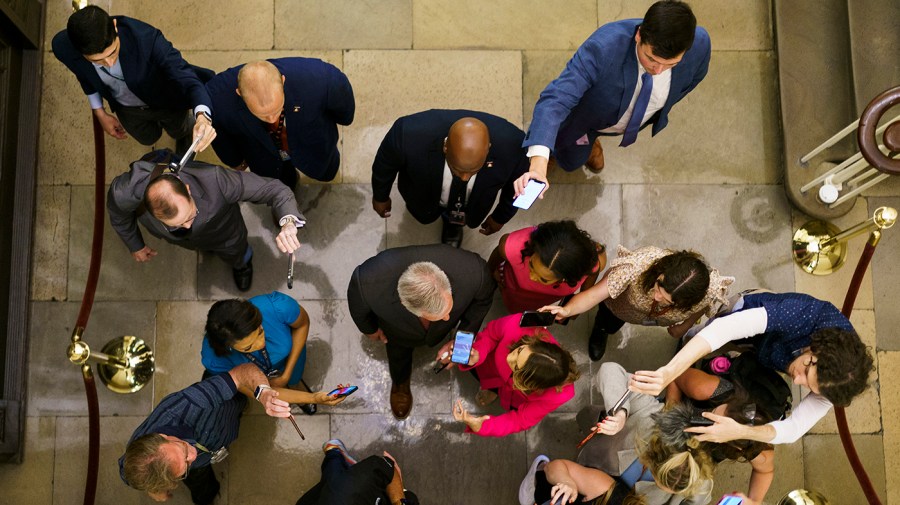Debt limit fight puts US on credit watch

The U.S. is on credit watch as high-stakes negotiations over the debt limit take center stage in Washington.
Credit agencies are warning that the nation’s stellar credit rating could be downgraded as the U.S. inches closer to running out of cash and defaulting on its roughly $31.4 trillion debt.
Capitol Hill is getting nervous.
“Most Americans treasure their individual credit rating and do everything they can to keep it as good as possible, at least if they have the circumstances that they can do so,” Rep. Susan Wild (D-Pa.) said this week, while raising concern that a “reduction in our credit rating is the beginning.”
Fitch Ratings, a prominent credit ratings agency, drew attention earlier this week when it warned the nation’s credit standing was at risk of a downgrade.
The agency — which, along with S&P Global Ratings (S&P) and Moody’s, is seen among the top three ratings agencies — said at the time that it would additionally be placing the country’s pristine AAA rating on “rating watch negative.” The move reflects “increased political partisanship that is hindering reaching a resolution to raise or suspend the debt limit despite the fast-approaching X-Date,” Fitch said.
Not long after that statement, credit rater DBRS Morningstar later also warned the U.S. was at risk of being downgraded, saying the current “debt ceiling impasse poses a potential threat to the United States’ AAA rating.”
Experts say they wouldn’t be surprised if there’s more to follow from other agencies in the coming days.
So, what’s the big deal?
The recent warnings indicate increased risk among investors that the nation’s reputation as “a creditworthy borrower could be called into question,” Rachel Snyderman, senior associate director of business and economic policy for the Bipartisan Policy Center, said Friday.
Snyderman recalled when Standard and Poor’s downagraded the U.S as a result of the 2011 debt limit standoff as lawmakers narrowly avoided a federal default with an eleventh-hour compromise.
“History has showed us that it doesn’t take defaulting on our obligations to yield significant impacts,” Snyderman said,.
“Investors are increasingly growing concerned that a deal has not yet been addressed and it should behoove lawmakers to to act in a timely manner.”
What would a credit downgrade mean?

Howard Gleckman of the Urban-Brookings Tax Policy Center told The Hill that such a development would “have a material effect on interest rates,” costing investors and everyday Americans “potentially a lot of money.”
“Let’s say that [a] Treasury security is paying you an interest rate of 3 percent,” he explained. “And now suddenly, what starts to happen is the rating agencies start saying that Treasury security may not be as secure and safe as you thought it was when you bought it.”
“If those Treasury securities start selling at 5 percent, that means that the value of your 3-percent bond goes down.”
But there are also other effects that Americans could see as a result, Gleckman said, including on mortgages, interest rates on credit cards and car loan — which are all connected to Treasury securities.
“All those things are either directly or indirectly tied to … interest rates on Treasury securities,” he said. “So, the higher interest rates on treasuries mean that interest rates are gonna go up on pretty much everything else, and that has a real impact on actual people.”
How are policymakers responding?

The Biden administration and congressional Democrats have been quick to seize on the warnings.
Shortly after Fitch’s warning, the Treasury Department said it “underscores the need for swift bipartisan action by Congress to raise or suspend the debt limit and avoid a manufactured crisis for our economy.”
Sen. Patty Murray (D-Wash.), head of the Senate Appropriations Committee, also sounded alarm on the heels of both warningswhile taking aim at Republicans.
“We’ve seen this movie before in 2011, and this entire spectacle is self-inflicted by House Republicans,” Murray said.
Some Republicans are also paying heed to the warnings.
Reacting to the notice from Fitch earlier this week, Rep. Patrick Henry (R-N.C.), chair of the House Financial Services Committee and key negotiator in talks, called the update “bad” and told The Hill he was worried about the development.
At the same time, however, GOP lawmakers have fiercly opposed Democratic calls for a debt limit increase without spending cuts attached.
Rep. Glenn Grothman (R-Wisc.) also said the threat of another high-profile downgrade certainly “matters,” but added he thinks “leadership in Congress realizes the dangers.”
“You know the unprecedented amount of debt, the high interest payments. I think it’d be reckless just to say we’re gonna do nothing, he said.
Will lawmakers pass a deal in time?

Treasury Secretary Janet Yellen said Friday the nation will run out of money to pay its bills by June 5 if lawmakers do not raise the debt ceiling. She previously warned the U.S. could default as soon as June 1.
Lawmakers had previously been looking to next Thursday as a deadline and tensions have risen in the absence of a deal and with default looming.
As negotiators hunkered down in the Capitol on Friday, Republicans signaled both sides were still having difficulty reaching a compromise as sticking points appeared to remain in several key areas, including work requirements and spending levels.
Asked if he was optimistic about chances of a deal being struck this weekend, Rep. Patrick McHenry (R-N.C.), a top GOP negotiator and ally of Speaker Kevin McCarthy (R-Calif.), told reporters “not yet.”
“I’m hopeful,” he said.
Mychael Schnell contributed.
Copyright 2023 Nexstar Media Inc. All rights reserved. This material may not be published, broadcast, rewritten, or redistributed. Regular the hill posts







